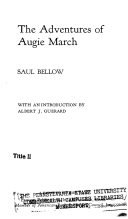Works
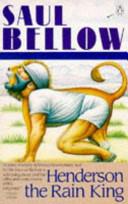
Henderson the Rain King
Saul Bellow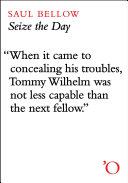
Seize the Day
Saul Bellow
The Dean's December
Saul Bellow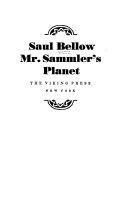
Mr. Sammler's Planet
Saul Bellow
Ravelstein
Saul Bellow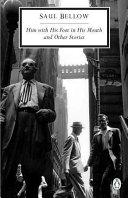
Him with His Foot in His Mouth and Other Stories
Saul Bellow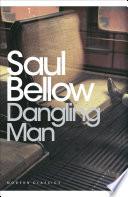
Dangling Man
Saul BellowFamous Saul Bellow Quotes
“You never have to change anything you got up in the middle of the night to write.”
As quoted in The #1 New York Times Bestseller (1992) by John Bear, p. 93
General sources
Source: Introduction to The Closing of the American Mind (1988), p. 12
Context: As a scholar [Allan Bloom] intends to enlighten us, and as a writer he has learned from Aristophanes and other models that enlightenment should also be enjoyable. To me, this is not the book of a professor, but that of a thinker who is willing to take the risks more frequently taken by writers. It is risky in a book of ideas to speak in one’s own voice, but it reminds us that the sources of the truest truths are inevitably profoundly personal. … Academics, even those describing themselves as existentialists, very seldom offer themselves publicly and frankly as individuals, as persons.
"Mozart: An Overture" (1992), pp. 13-14
It All Adds Up (1994)
Context: There is no need to make an inventory of the times. It is demoralizing to describe ourselves to ourselves yet again. It is especially hard on us since we believe (as we have been educated to believe) that history has formed us and that we are all mini-summaries of the present age.
“When we ask for advice, we are usually looking for an accomplice.”
Demander un conseil, c'est presque toujours chercher un complice. — Adélaïde-Édouard le Lièvre, marquis de La Grange et de Fourilles (1796–1876), Pensées (1872) http://books.google.com/books?id=_YcDAAAAMAAJ&pg=RA2-PA479&dq=%22Demander+un+conseil,+c'est+presque+toujours+chercher+un+complice%22&hl=en
Misattributed
Saul Bellow Quotes about people
Source: Conversations with Saul Bellow
“Some people, if they didn't make it hard for themselves, might fall asleep.”
Source: The Adventures of Augie March
Saul Bellow Quotes about life
Humboldt's Gift (1975) [Penguin Classics, 1996, ISBN 0-140-18944-0], p. 5
General sources
Saul Bellow: Trending quotes
Part I, p. 26
A Jewish Writer in America (2011)
Part I, p. 26
A Jewish Writer in America (2011)
Saul Bellow Quotes
“Human beings can lose their lives in libraries. They ought to be warned.”
"Him with His Foot in His Mouth," from Him with His Foot in His Mouth and Other Stories (1984) [Penguin Classics, 1998, ISBN 0-141-18023-4], p. 11
General sources
“This is what makes packaged opinion so attractive.”
"There Is Simply Too Much to Think About" (1992), pp. 173-174
It All Adds Up (1994)
Context: There is simply too much to think about. It is hopeless — too many kinds of special preparation are required. In electronics, in economics, in social analysis, in history, in psychology, in international politics, most of us are, given the oceanic proliferating complexity of things, paralyzed by the very suggestion that we assume responsibility for so much. This is what makes packaged opinion so attractive.
Nobel Prize lecture http://nobelprize.org/nobel_prizes/literature/laureates/1976/bellow-lecture.html (12 December 1976)
General sources
Context: Writers are greatly respected. The intelligent public is wonderfully patient with them, continues to read them, and endures disappointment after disappointment, waiting to hear from art what it does not hear from theology, philosophy, social theory, and what it cannot hear from pure science. Out of the struggle at the center has come an immense, painful longing for a broader, more flexible, fuller, more coherent, more comprehensive account of what we human beings are, who we are and what this life is for.
Nobel Prize lecture (12 December 1976)
General sources
Context: A novel is balanced between a few true impressions and the multitude of false ones that make up most of what we call life. It tells us that for every human being there is a diversity of existences, that the single existence is itself an illusion in part, that these many existences signify something, tend to something, fulfill something; it promises us meaning, harmony, and even justice.
As quoted in The Portable Curmudgeon (1987) by Jon Winokur, p. 219
General sources
“In the greatest confusion there is still an open channel to the soul.”
Foreword to The Closing of the American Mind by Allan Bloom (1987)
General sources
Context: In the greatest confusion there is still an open channel to the soul. It may be difficult to find because by midlife it is overgrown, and some of the wildest thickets that surround it grow out of what we describe as our education. But the channel is always there, and it is our business to keep it open, to have access to the deepest part of ourselves.
Source: Introduction to The Closing of the American Mind (1988), pp. 16-17
Context: In the greatest confusion there is still an open channel to the soul. It may be difficult to find because by midlife it is overgrown, and some of the wildest thickets that surround it grow out of what we describe as our education. But the channel is always there, and it is our business to keep it open, to have access to the deepest part of ourselves—to that part of us which is conscious. … The independence of this consciousness, which has the strength to be immune to the noise of history and the distractions of our immediate surroundings, is what the life struggle is all about. The soul has to find and hold its ground against hostile forces, sometimes embodied in ideas which frequently deny its very existence, and which indeed often seem to be trying to annul it altogether.
“In an age of enormities, the emotions are naturally weakened.”
"The Distracted Public" (1990), p. 156
It All Adds Up (1994)
Context: In an age of enormities, the emotions are naturally weakened. We are continually called upon to have feelings — about genocide, for instance, or about famine or the blowing up of passenger planes — and we are all aware that we are incapable of reacting appropriately. A guilty consciousness of emotional inadequacy or impotence makes people doubt their own human weight.
“We do not make up history and culture. We simply appear, not by our own choice.”
Great Jewish Short Stories, introduction to the Dell paperback edition (1963)
General sources
Context: We are all such accidents. We do not make up history and culture. We simply appear, not by our own choice. We make what we can of our condition with the means available. We must accept the mixture as we find it — the impurity of it, the tragedy of it, the hope of it.
Henderson the Rain King (1959) [Viking/Penguin, 1984, ], ch. XVIII, p. 271
General sources
"A Second Half Life" (1991), p. 326
It All Adds Up (1994)
Context: Much of junk culture has a core of crisis — shoot-outs, conflagrations, bodies weltering in blood, naked embracers or rapist-stranglers. The sounds of junk culture are heard over a ground bass of extremism. Our entertainments swarm with specters of world crisis. Nothing moderate can have any claim to our attention.
"Literary Notes on Khrushchev" (1961), p. 36
It All Adds Up (1994)
Context: The principles of Western liberalism seem no longer to lend themselves to effective action. Deprived of the expressive power, we are awed by it, have a hunger for it, and are afraid of it. Thus we praise the gray dignity of our soft-spoken leaders, but in our hearts we are suckers for passionate outbursts, even when those passionate outbursts are hypocritical and falsely motivated.
"A Half Life" (1990), pp. 302-303
It All Adds Up (1994)
Context: There's something that remains barbarous in educated people, and lately I've more and more had the feeling that we are nonwondering primitives. And why is it that we no longer marvel at these technological miracles? They've become the external facts of every life. We've all been to the university, we've had introductory courses in everything, and therefore we have persuaded ourselves that if we had the time to apply ourselves to these scientific marvels, we would understand them. But of course that's an illusion. It couldn't happen. Even among people who have had careers in science. They know no more about how it all works than we do. So we are in the position of savage men who, however, have been educated into believing that they are capable of understanding everything. Not that we actually do understand, but that we have the capacity.
"The Distracted Public" (1990), p. 167
It All Adds Up (1994)
Context: Writers, poets, painters, musicians, philosophers, political thinkers, to name only a few of the categories affected, must woo their readers, viewers, listeners, from distraction. To this we must add, for simple realism demands it, that these same writers, painters, etc., are themselves the children of distraction. As such, they are peculiarly qualified to approach the distracted multitudes. They will have experienced the seductions as well as the destructiveness of the forces we have been considering here. This is the destructive element in which we do not need to be summoned to immerse ourselves, for we were born to it.
"A Half Life" (1990), pp. 302-303
It All Adds Up (1994)
Context: There's something that remains barbarous in educated people, and lately I've more and more had the feeling that we are nonwondering primitives. And why is it that we no longer marvel at these technological miracles? They've become the external facts of every life. We've all been to the university, we've had introductory courses in everything, and therefore we have persuaded ourselves that if we had the time to apply ourselves to these scientific marvels, we would understand them. But of course that's an illusion. It couldn't happen. Even among people who have had careers in science. They know no more about how it all works than we do. So we are in the position of savage men who, however, have been educated into believing that they are capable of understanding everything. Not that we actually do understand, but that we have the capacity.
“A great deal of intelligence can be invested in ignorance when the need for illusion is deep.”
Compare: It’s a point so blindingly obvious that only an extraordinarily clever and sophisticated person could fail to grasp it.
John Bercow, 2016.
General sources
Variant: There is no limit to the amount of intelligence invested in ignorance when the need for illusion runs deep.
Source: To Jerusalem and Back: A Personal Account (1976), p. 127
“Everybody needs his memories. They keep the wolf of insignificance from the door.”
Mr. Sammler's Planet (1970) [Penguin Classics, 2004, ISBN 0-142-43783-2], p. 156
General sources
“Boredom is the conviction that you can't change… the shriek of unused capacities.”
Source: The Adventures of Augie March
Quoted in "Feeling Rejected? Join Updike, Mailer, Oates..." by Barbara Bauer and Robert F. Moss, New York Times (21 July 1985), section 7, page 1, column 1
General sources
“If I'm out of my mind, it's all right with me, thought Moses Herzog.”
Source: Herzog
Source: The Adventures of Augie March
General sources
Source: Henderson the Rain King (1959) [Viking/Penguin, 1984, ISBN 0-140-07269-1], ch. XVIII, p. 271
“Conquered people tend to be witty.”
Mr. Sammler's planet, (1976), p. 98
General sources
“It seems, after all that there are no nonpeculiar people.”
Source: Humboldt's Gift
“Goodness is achieved not in a vacuum, but in the company of other men, attended by love.”
Dangling Man (1944) [Penguin Classics, 1996, ISBN 0-140-18935-1], p. 84
General sources
BBC radio interview, The Listener (London, 1969-05-22)
General sources
Quoted by Granville Hicks in The Living Novel: A Symposium (Macmillan, 1957; digitized version in 2006), p. ix
General sources
The Dean’s December (1982) [Penguin Classics, 1998, ISBN 0-140-18913-0], ch. 13, p. 140
General sources
“I never yet touched a fig leaf that didn't turn into a price tag.”
Humboldt's Gift (1975), p. 159
General sources
To Jerusalem and Back: A Personal Account (1976), p. 38
General sources
“All a writer has to do to get a woman is to say he's a writer. It's an aphrodisiac.”
As quoted in "Dailer's Choice" by Harriet Van Horne, in New York Magazine Vol. 10, No. 13 (28 March 1977), p. 80
General sources



